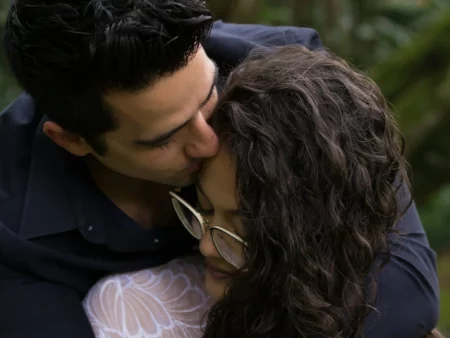
Let’s explore why some repeatedly attract ‘jerks’ and how to break this cycle.
Understanding the Cycle of Dating Jerks
The allure of “bad boys” and “mean girls” often stems from deep-seated psychological needs. Dr. Amelia Thornton, a renowned relationship psychologist, explains,
“We’re drawn to what’s familiar, even if it’s unhealthy. This attachment to toxic partners is often rooted in childhood experiences. For instance, someone who grew up with inconsistent parental love may subconsciously seek out similar dynamics in adult relationships, mistaking chaos for passion.”
Unresolved issues from our past can create a subconscious attraction to conflict. We may mistake intensity for passion, confusing drama with excitement. This cycle perpetuates itself as we seek to “fix” our partners, hoping to heal our own wounds in the process.
Breaking this pattern requires awareness and introspection. It’s crucial to examine our motivations and expectations. Are we choosing partners based on genuine connection, or are we seeking to fill an emotional void? Maintaining confidence throughout this process is essential.
The journey towards healthier relationships involves rewiring our attraction patterns. This process demands patience and self-compassion. As we learn to value stability and authenticity, we open ourselves to more fulfilling partnerships.
Remember, jerk-like behavior isn’t a sign of strength—it’s often a mask for insecurity. True strength lies in vulnerability, honesty, and mutual support. Understanding why we keep dating jerks is the first step towards change.
Now that we understand why we might be drawn to ‘jerks’, let’s explore how to identify the characteristics of a genuinely nice partner.
Recognizing the Characteristics of a Nice Guy
Distinguishing a genuinely nice guy from those who merely wear the mask of kindness requires keen observation and emotional intelligence. Let’s explore the hallmarks of true goodness in potential partners:
- Consistency in words and actions, demonstrating reliability and integrity
- Comfort with vulnerability, sharing feelings and experiences openly
- Boundaries that are clear, respectful, and mutually agreed upon
- Recognition of your achievements and personal growth
- Gentleness in approach, especially during disagreements
- Openness to feedback and willingness for self-improvement
- Validation of your emotions without judgment
- Appreciation for your individuality and aspirations
- Presence in the moment, giving undivided attention
- Reciprocity in effort and emotional investment
- Commitment to the relationship’s long-term success
- Trust in your abilities and decisions
These traits form the foundation of a healthy partnership. A genuinely nice guy embodies a balance of strength and compassion, demonstrating worthiness through actions rather than empty promises. He fosters a sense of security and acceptance, allowing for authentic self-expression and mutual empowerment.
Remember, true goodness is rooted in mindfulness and emotional maturity. It’s about maintaining confidence while fostering genuine connection. As you navigate relationships, stay attuned to these qualities, ensuring they align with your values and contribute to your self-worth. Understanding why we keep dating jerks can help us appreciate the better things about nice guys.
With a clear picture of what makes a ‘nice guy’, it’s time to turn inward and focus on the crucial step of self-reflection and healing.
Self-Reflection and Healing: Preparing for a Healthy Relationship
Embarking on a journey towards healthier relationships begins with introspection. Before seeking external connections, it’s crucial to cultivate self-understanding. This process of self-reflection lays the foundation for more fulfilling partnerships.
Dr. Eleanor Finn, a renowned psychotherapist, offers this insight:
“The most transformative relationship you’ll ever have is the one with yourself. It’s in this space of self-discovery that we uncover our true desires, confront our fears, and learn to trust our intuition. For instance, a client once realized through journaling that her attraction to emotionally unavailable men stemmed from childhood experiences, leading to a breakthrough in her dating patterns.”
To kickstart your self-reflection journey, consider these exercises:
1. Journal your relationship history, noting patterns and emotional triggers.
2. Create a ‘values inventory’ to identify what truly matters in a partner.
3. Practice daily mindfulness to increase self-awareness.
4. Engage in ‘future self’ visualization, imagining ideal relationship dynamics.
Remember, this process isn’t about achieving perfection, but fostering self-trust. As you delve deeper, you may find yourself gravitating towards more good, genuine connections.
It’s important to acknowledge that this adjustment period can be challenging. You might question your progress or feel tempted to revert to old habits. During these moments, remaining confident is key. Celebrate small victories and be patient with yourself.
As you cultivate self-love and awareness, you’ll likely find your standards elevating. You’ll begin to recognize the true value of nice individuals who offer genuine emotional availability.
Remember, the goal isn’t perfection, but authenticity. This quality attracts and sustains meaningful relationships. Understanding past choices can help us appreciate healthier dynamics.
As we work on ourselves, it’s essential to address deeper issues that may be influencing our relationship choices.
Addressing Attachment Issues and Past Traumas
Our past experiences shape our present relationships in subtle ways. Dr. Maya Stein, a renowned psychoanalyst, explains, “Childhood dynamics create a blueprint for adult connections. A child who felt neglected might unconsciously seek unavailable individuals, perpetuating familiar emotional landscapes.”
Understanding your attachment style is crucial. Are you anxious, constantly seeking reassurance? Or avoidant, keeping emotional distance? Perhaps you’re disorganized, fluctuating between extremes? Recognizing these patterns is the first step toward change.
Unresolved traumas can manifest as relationship sabotage. For instance, fear of abandonment might lead to excessive clinginess, inadvertently pushing away potential nice individuals. It’s essential to address these wounds through professional guidance.
Consider exploring therapies like EMDR or cognitive-behavioral approaches. These can help reframe past experiences and develop healthier coping mechanisms. Remember, seeking help is a sign of strength, not weakness.
As you embark on this healing journey, practice self-compassion. Healing isn’t linear; setbacks are normal. Maintaining confidence throughout this process is crucial for personal development and future relationship success.
With a better understanding of our attachment issues, let’s explore how to consciously change our attraction patterns.
Rewiring Your Attraction Patterns
Recalibrating our attraction compass demands a shift from fleeting excitement to enduring fulfillment. Dr. Amelia Russo, a relationship psychologist, explains, “We often mistake intensity for intimacy. The key is appreciating the subtle warmth of genuine connection over superficial charm’s fireworks.”
To rewire your attraction patterns, cultivate self-awareness. Notice how behaviors trigger emotional responses. Are you drawn to unpredictability’s thrill? Do you confuse aloofness with mystery? Recognizing these tendencies is crucial for conscious choices.
| Initial Appeal of ‘Jerks’ | Long-Term Benefits of a Nice Guy |
|---|---|
| Unpredictability’s excitement | Emotional stability and security |
| Intense chemistry | Deep, lasting companionship |
| ‘Winning’ affection challenge | Mutual respect and appreciation |
| Drama mistaken for passion | Genuine emotional intimacy |
| Superficial attraction | Shared values and growth |
Practice mindfulness in interactions. When meeting potential partners, focus on qualities contributing to lasting happiness: empathy, reliability, and shared values. Dr. Russo advises, “Seek someone who makes you feel safe being yourself, not on edge.”
Communication is key in this process. Express your needs clearly and listen actively to understand your partner’s perspective. This fosters a deeper connection and helps avoid misunderstandings.
Now that we’re recalibrating our attraction radar, it’s time to learn how to build trust and vulnerability with a genuinely nice partner.
Building Trust and Vulnerability with a Nice Guy
Embarking on a relationship with a genuinely nice individual after enduring toxic connections can feel like navigating uncharted waters. The journey towards vulnerability and trust requires patience and self-compassion. Dr. Evelyn Chen, a relationship psychologist, advises, “Think of trust as a garden. It needs consistent nurturing and time to flourish.”
To cultivate this garden of trust, start with small acts of openness. Share your thoughts and feelings gradually, allowing your partner to reciprocate. This measured approach helps build a foundation of mutual understanding and emotional safety.
Address your fears head-on by acknowledging them to yourself and your partner. Expressing your concerns can lead to deeper intimacy. For instance, you may say, “I’m afraid about opening up because of my past, but I want to try to be vulnerable with you.”
Practice self-reflection to identify lingering trust issues. Journaling or speaking with a therapist can help uncover and process these feelings. Create a safe environment for vulnerability by establishing clear boundaries and respecting each other’s limits. This mutual respect fosters a sense of security, allowing trust to blossom naturally.
As you navigate this new terrain, remember that setbacks are normal. Each step forward, even if it’s small, is a victory. By embracing the journey of trust-building with a nice partner, you’re paving the way for a fulfilling relationship.
Consider seeking guidance from a relationship coach or counselor to navigate this transition. They can provide tailored strategies for building trust and fostering emotional intimacy. Understanding past relationship patterns can help you appreciate and nurture your new, healthier connection.
As trust grows, effective communication becomes crucial. Let’s explore techniques to deepen your connection with a nice guy.
Communication Techniques for Deeper Connection
Mastering the art of communication is pivotal in nurturing a deep connection with a nice partner. Dr. Evelyn Chen, a renowned relationship psychologist, emphasizes, “Effective dialogue is the cornerstone of intimacy. It’s about creating a safe space where both partners feel heard and understood.”
To foster meaningful exchanges, consider these innovative strategies:
- Practice “emotional mirroring” by reflecting your partner’s feelings in your responses
- Implement the “10-second rule” – pause before replying to ensure thoughtful communication
- Utilize “curiosity questions” to delve deeper into your partner’s perspective
- Adopt “non-verbal affirmations” like gentle touches to reinforce active listening
- Engage in “collaborative storytelling” to build shared narratives and strengthen bonds
- Use “I-statements” to express feelings without blame or judgment
- Schedule regular “check-ins” to discuss relationship dynamics openly
Remember, authenticity is key. Dr. Chen advises, “Be genuine in your interactions. Vulnerability fosters trust and deepens emotional intimacy.” Being brave while opening up can be challenging but rewarding.
Embrace the “language of appreciation” by regularly expressing gratitude for your partner’s qualities and actions. This practice nurtures a positive atmosphere and reinforces emotional bonds. Understanding past relationship patterns can help you appreciate these healthier dynamics.
With improved communication skills, it’s time to navigate the adjustment period that comes with dating a nice guy.
Maintaining Independence and Self-Worth
Embarking on a journey with a nice individual doesn’t mean losing your identity. Dr. Samantha Frost, a relationship psychologist, advises, “Think of your relationship as two whole individuals coming together, not two halves seeking completion.” This perspective fosters long-term satisfaction and personal growth.
To maintain independence, prioritize interests and friendships outside the relationship. Dedicate time to solo activities that fuel your passions. Pursuing individual goals enriches your partnership by bringing fresh experiences and perspectives to share.
Nurturing self-worth involves practicing self-compassion and setting healthy boundaries. Dr. Frost suggests, “Create a ‘personal values’ checklist and revisit it monthly to ensure you’re honoring your authentic self.” This practice reinforces your individuality within the relationship.
Balancing personal aspirations with couple goals requires open dialogue. Discuss your ambitions, supporting each other while finding common ground. Remember, a healthy relationship enhances your life without defining it. As you navigate this balance, understanding past relationship dynamics can illuminate your progress in cultivating a more fulfilling partnership.
With a strong sense of self, you’re better equipped to recognize the signs of a healthy relationship. Let’s explore how to distinguish between red and green flags.
Red Flags vs. Green Flags: Assessing Relationship Health
Navigating the terrain of healthy relationships requires a discerning eye. Dr. Olivia Chen, a relationship psychologist, emphasizes, “Recognizing the subtle differences between toxic and nurturing behaviors is crucial for long-term happiness.” Let’s explore these distinctions:
| Red Flags | Green Flags |
|---|---|
| Inconsistent communication | Regular, open dialogue with active listening |
| Disregard for boundaries | Mutual respect for personal space and individuality |
| Emotional manipulation | Genuine emotional support and empathy |
| Jealousy and possessiveness | Trust, independence, and encouragement of personal growth |
| Dismissive of feelings | Validation of emotions and shared vulnerability |
Dr. Chen advises, “Pay attention to how you feel in their presence. A healthy relationship should uplift, not deplete you.” Nice individuals foster environments where both people thrive independently and together.
Consider the “3 C’s” when evaluating relationship health: Compatibility, Consistency, and Compassion. These elements are what lasting connections are based on.
Remember, healthy relationships evolve gradually. Dr. Chen notes, “Initial excitement shouldn’t overshadow the importance of steady, reliable affection.” Understanding past relationship dynamics can illuminate the value of these positive indicators.
Armed with the knowledge to identify healthy relationships, let’s wrap up with some key takeaways for your journey towards lasting, fulfilling love.
Conclusion: Embracing a Future of Healthy Love
Cultivating a healthy relationship is an ongoing journey of growth and discovery. Embrace the warmth of genuine connections, allowing yourself to flourish with a nice individual. Trust your newfound wisdom and the power of self-reflection. Create a love story that aligns with your true self. Your heart deserves authentic, lasting happiness.
As we conclude our exploration of dating nice guys after jerks, you might still have some questions. Let’s address some common concerns in our FAQ section.
FAQs About Dating a Nice Guy After Toxic Relationships
What if I'm not feeling the 'spark' with a nice guy?
A lack of immediate chemistry with a nice individual isn't a dealbreaker. Genuine connections often grow slowly through shared experiences. Stay confident while nurturing natural affection. Explore activities together to cultivate organic intimacy. Understanding past choices can illuminate the value of steady relationships.
How can I trust my judgment in choosing partners after dating jerks?
Rebuilding trust in your judgment post-toxic relationships demands introspection. Cultivate self-awareness through therapy or journaling to identify red flags. Practice mindfulness to hone intuition. Gradually explore connections with nice individuals.
Is it normal to feel bored in a healthy relationship compared to toxic ones?
Feeling bored in a stable relationship after toxic experiences is common. The calm may seem dull, but it's fertile ground for deeper connections. Embrace this tranquility as a chance for mutual growth. Confidence in choosing a nice partner fosters lasting contentment.
How do I overcome the fear of being vulnerable with a new partner?
Overcoming vulnerability fears requires gradual self-compassion. Start with small disclosures, building trust naturally. Practice mindfulness during intimate moments. Challenge negative self-talk with positive affirmations. A nice partner appreciates openness.
What if my nice guy partner becomes controlling or possessive?
If a seemingly nice individual shows controlling tendencies, address it promptly. Communicate openly, set clear boundaries, and preserve your autonomy. Seek support if needed. Remember, true kindness respects personal freedom. Embracing past helps nurture healthy connections.
How can I maintain attraction to a nice guy long-term?
Sustaining attraction to a nice individual requires effort. Cultivate shared interests and explore new experiences together. Practice gratitude, focusing on positive qualities. Prioritize intimacy and emotional connection. Be confident about your choice. Analyze your previous relationships to appreciate your current dynamic.
Should I tell my new partner about my past toxic relationships?
Sharing past experiences can foster intimacy, but timing matters. Gradual disclosure builds trust naturally. Focus on lessons learned, not negative details. A nice individual will appreciate openness when appropriate. Moreover, sincerity is a nice way to lasting bonds with your new partner.

Jeffrey Young is an American psychologist renowned for developing schema therapy. He founded the Schema Therapy Institute and is a leader in the field of cognitive behavioral therapy. Young has authored several influential books, including Schema Therapy for professionals and Reinventing Your Life for the general public.







